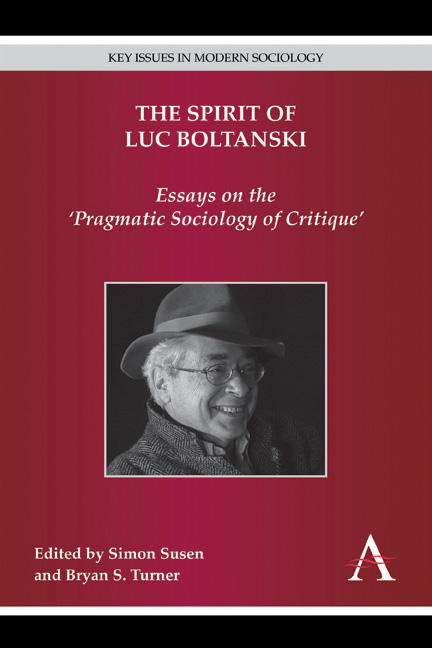Book contents
- Frontmatter
- CONTENTS
- List of Contributors
- Preface
- Part I Introductory Remarks
- Part II Luc Boltanski and (Post-) Classical Sociology
- Part III Luc Boltanski and Pragmatism
- Part IV Luc Boltanski and Critique
- 5 Is There Such a Thing as a ‘Pragmatic Sociology of Critique’? Reflections on Luc Boltanski's On Critique
- 6 Strengths and Limitations of Luc Boltanski's On Critique
- 7 A Renewal of Social Theory That Remains Necessary: The Sociology of Critical Capacity Twenty Years After
- 8 Enlarging Conceptions of Testing Moments and Critical Theory: Economies of Worth, On Critique, and Sociology of Engagements
- Part V Luc Boltanski and Critical Sociology
- Part VI Luc Boltanski and Political Sociology
- Part VII Luc Boltanski and Contemporary Issues
- Part VIII Luc Boltanski in Conversation
- Part IX Luc Boltanski and His Critics
- Index of Names
- Index of Subjects
5 - Is There Such a Thing as a ‘Pragmatic Sociology of Critique’? Reflections on Luc Boltanski's On Critique
from Part IV - Luc Boltanski and Critique
Published online by Cambridge University Press: 05 December 2014
- Frontmatter
- CONTENTS
- List of Contributors
- Preface
- Part I Introductory Remarks
- Part II Luc Boltanski and (Post-) Classical Sociology
- Part III Luc Boltanski and Pragmatism
- Part IV Luc Boltanski and Critique
- 5 Is There Such a Thing as a ‘Pragmatic Sociology of Critique’? Reflections on Luc Boltanski's On Critique
- 6 Strengths and Limitations of Luc Boltanski's On Critique
- 7 A Renewal of Social Theory That Remains Necessary: The Sociology of Critical Capacity Twenty Years After
- 8 Enlarging Conceptions of Testing Moments and Critical Theory: Economies of Worth, On Critique, and Sociology of Engagements
- Part V Luc Boltanski and Critical Sociology
- Part VI Luc Boltanski and Political Sociology
- Part VII Luc Boltanski and Contemporary Issues
- Part VIII Luc Boltanski in Conversation
- Part IX Luc Boltanski and His Critics
- Index of Names
- Index of Subjects
Summary
In the contemporary sociological literature, not only in the Francophone world but also in Germanophone and Anglophone contexts, the work of Luc Boltanski is widely recognized as a major contribution to the social sciences. The value and influence of Boltanski's writings manifest themselves in the emergence of a new paradigm: the sociology of critique or, as it has been recently characterized not only by sympathetic and unsympathetic critics alike but also by the author himself, the pragmatic sociology of critique. It is true that the concept of critique plays a pivotal role in most of Boltanski's writings. His recent book On Critique is particularly important in this regard, since it is symptomatic of the author's attempt to explain both the place and the function that discursive processes occupy within the sociological approach that he has developed over the past decades.
From a terminological point of view, the Boltanskian paradigm is based on three key concepts: ‘sociology’, ‘pragmatic’, and ‘critique’. Given their centrality, it makes sense to reflect on the meaning attached to them in Boltanski's work.
The first term – ‘sociology’ – reminds us of the fact that, whilst the intellectual currents that have influenced Boltanski's approach are diverse, and although the scope of his writings transcends disciplinary boundaries, his oeuvre is embedded mainly in one specific field of research: empirical sociology. Neighbouring disciplines – such as philosophy, anthropology, history, linguistics, economics, and political science – have certainly inspired the Boltanskian project for some time, just as these disciplines have begun to draw upon Boltanskian insights. To the extent that the epistemological underpinnings of his work are firmly situated in the field of sociological studies, Boltanski's writings express an unambiguous concern with ‘the nature of the social’ – that is, with the phenomena and forces that shape, or depend upon, both the constitution and the evolution of human relations.
- Type
- Chapter
- Information
- The Spirit of Luc BoltanskiEssays on the 'Pragmatic Sociology of Critique', pp. 173 - 210Publisher: Anthem PressPrint publication year: 2014



